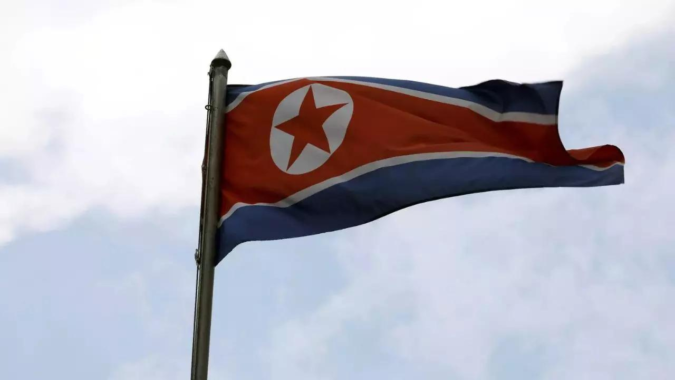SEOUL: North Korea has allowed citizens stranded abroad by its strict Covid curbs to return home, state media reported Sunday, as the country moves towards a full reopening after three years of pandemic isolation.
The country had sealed its borders since early 2020 to protect itself from Covid-19, which prevented even its own nationals from returning.
But there have been increasing signs of a shift in border control in recent weeks, including the resumption of international commercial air travel.
In a statement carried by the Korean Central News Agency, the State Emergency Epidemic Prevention Headquarters said North Korean citizens abroad had been allowed to return home in line with “the eased worldwide pandemic situation”.
“Those returned will be put under proper medical observation at quarantine wards for a week,” it added.
The move signals that North Korea will shift its stringent Covid policy and gradually ease quarantine measures, Cheong Seong-chang, a researcher at the Sejong Institute, told AFP.
“With the latest announcement, it’s expected that a large-scale return of North Koreans will be made via the land route as well,” he added.
Last month, high-level Chinese and Russian delegations visited Pyongyang for a key anniversary celebration, the first foreign dignitaries allowed to visit the country in years.
And earlier this month, a delegation of North Korean athletes was allowed to attend a taekwondo competition in Kazakhstan, while state-run Air Koryo made its first international commercial flight in three years last week.
Despite the signs of easing of its pandemic isolation, analysts say North Korea is not yet ready to fully reopen its borders.
“First, North Koreans have not been vaccinated,” said Cho Han-bum, senior research fellow at the Korea Institute for National Unification.
He added Pyongyang was likely frightened by the “collapse” of China’s medical system after its abrupt decision last December to end its three-year zero-Covid policy.
The sudden end of curbs led to a massive surge in hospitalisations and deaths in China that health experts say were largely unreported by the government, with some studies saying nearly two million people died in the following weeks.
North Korea has a crumbling health system — one of the worst in the world — and no Covid vaccines, antiviral treatment drugs or mass testing capacity, and Cho said the situation was expected to be far worse.
The “very limited” flight service to China and Russia and allowing overseas citizens to return home “is by no means a complete reopening of the border,” said Leif-Eric Easley, a professor at Ewha University in Seoul.
The one-week quarantine for returning citizens suggests that tourism to North Korea will not be resumed any time soon, added Cheong of the Sejong Institute.
The country had sealed its borders since early 2020 to protect itself from Covid-19, which prevented even its own nationals from returning.
But there have been increasing signs of a shift in border control in recent weeks, including the resumption of international commercial air travel.
In a statement carried by the Korean Central News Agency, the State Emergency Epidemic Prevention Headquarters said North Korean citizens abroad had been allowed to return home in line with “the eased worldwide pandemic situation”.
“Those returned will be put under proper medical observation at quarantine wards for a week,” it added.
The move signals that North Korea will shift its stringent Covid policy and gradually ease quarantine measures, Cheong Seong-chang, a researcher at the Sejong Institute, told AFP.
“With the latest announcement, it’s expected that a large-scale return of North Koreans will be made via the land route as well,” he added.
Last month, high-level Chinese and Russian delegations visited Pyongyang for a key anniversary celebration, the first foreign dignitaries allowed to visit the country in years.
And earlier this month, a delegation of North Korean athletes was allowed to attend a taekwondo competition in Kazakhstan, while state-run Air Koryo made its first international commercial flight in three years last week.
Despite the signs of easing of its pandemic isolation, analysts say North Korea is not yet ready to fully reopen its borders.
“First, North Koreans have not been vaccinated,” said Cho Han-bum, senior research fellow at the Korea Institute for National Unification.
He added Pyongyang was likely frightened by the “collapse” of China’s medical system after its abrupt decision last December to end its three-year zero-Covid policy.
The sudden end of curbs led to a massive surge in hospitalisations and deaths in China that health experts say were largely unreported by the government, with some studies saying nearly two million people died in the following weeks.
North Korea has a crumbling health system — one of the worst in the world — and no Covid vaccines, antiviral treatment drugs or mass testing capacity, and Cho said the situation was expected to be far worse.
The “very limited” flight service to China and Russia and allowing overseas citizens to return home “is by no means a complete reopening of the border,” said Leif-Eric Easley, a professor at Ewha University in Seoul.
The one-week quarantine for returning citizens suggests that tourism to North Korea will not be resumed any time soon, added Cheong of the Sejong Institute.
